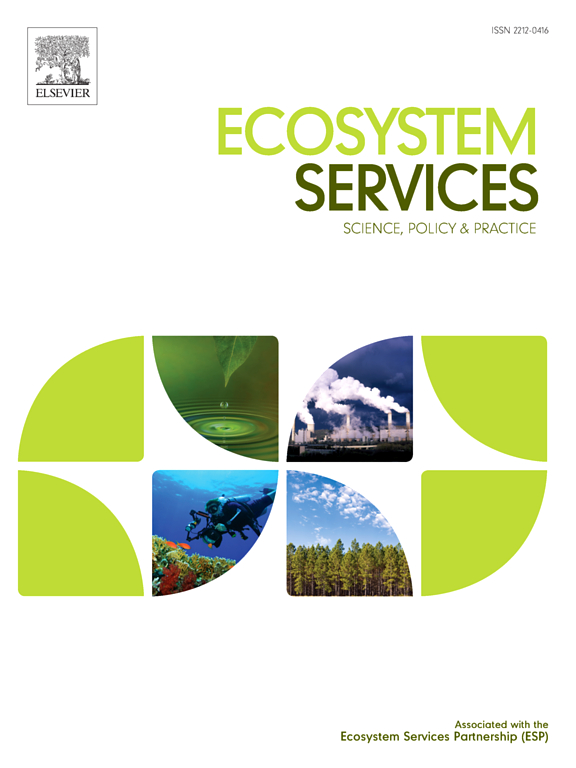Sustainability assessment of agricultural practices integrating both LCA and ecosystem services approaches
IF 6.6
2区 环境科学与生态学
Q1 ECOLOGY
引用次数: 0
Abstract
There is a pressing need to deal with the sustainability of agricultural management practices to adapt and mitigate the impacts of climate change on agriculture, while ensuring the food provision. Sustainable intensification emerges as a feasible alternative while the sustainability assessment of agriculture is still unclear in the scientific literature. The most widely comprehensive assessment tools are the Life Cycle Analysis (LCA) and the Ecosystem Services (ES) approaches, being them frequently employed isolated. Despite there are several proposals to integrate both approaches, none of them are focus on economic valuation for policy analysis.
This study proposes a methodology for the sustainability assessment of agricultural practices that considers the relationship between society and ecosystems, integrating both LCA, ES approaches within the Drivers-Pressures-State-Impact-Response (DPSIR) causal framework. ES is considered as the driving approach based on human well-being as the ultimate objective of sustainability. Thereby monetary valuation would quantify the net contribution of agricultural practices to human well-being.
The proposed methodology is employed for the sustainability assessment of a set of Best Management Practices (BMPs) for sustainable intensification in intensively irrigated agriculture, with the lemon crop in the Campo de Cartagena (Region de Murcia, Spain) serving as an illustrative example, constituting a useful guide for application in other contexts. The obtained results underscore the need to integrate both positive and negative impacts of agriculture on human well-being through monetary valuation and highlight the dominance of market values over non-market values in highly intensive agroecosystems. The regulated deficit irrigation and incorporation crop residues to the soil practices emerge as the BMPs with the highest total economic value, surpassing the conventional management due to the relevance of its contributions to human well-being.
结合生命周期评估和生态系统服务方法对农业实践进行可持续性评估
迫切需要处理农业管理做法的可持续性问题,以适应和减轻气候变化对农业的影响,同时确保粮食供应。可持续集约化作为一种可行的替代方案出现,而农业的可持续性评估在科学文献中仍不明确。最广泛全面的评估工具是生命周期分析(LCA)和生态系统服务(ES)方法,它们经常被孤立地使用。尽管有一些建议将这两种方法结合起来,但它们都没有把重点放在政策分析的经济评估上。本研究提出了一种农业实践可持续性评估方法,该方法考虑了社会与生态系统之间的关系,在驱动因素-压力-状态-影响-响应(DPSIR)因果框架内整合了LCA和ES方法。ES被认为是基于人类福祉作为可持续发展的最终目标的驱动方法。因此,货币估值将量化农业实践对人类福祉的净贡献。拟议的方法被用于对集约灌溉农业可持续集约化的一套最佳管理做法(BMPs)的可持续性评估,以卡塔赫纳Campo de Cartagena(西班牙穆尔西亚地区)的柠檬作物为例,为在其他情况下的应用提供了有用的指南。获得的结果强调需要通过货币评估来整合农业对人类福祉的积极和消极影响,并强调在高度集约化的农业生态系统中,市场价值对非市场价值的主导地位。由于其对人类福祉的贡献,规范的赤字灌溉和将作物残留物纳入土壤的做法成为具有最高总经济价值的bmp,超过了传统管理。
本文章由计算机程序翻译,如有差异,请以英文原文为准。
求助全文
约1分钟内获得全文
求助全文
来源期刊

Ecosystem Services
ECOLOGYENVIRONMENTAL SCIENCES&-ENVIRONMENTAL SCIENCES
CiteScore
14.90
自引率
7.90%
发文量
109
期刊介绍:
Ecosystem Services is an international, interdisciplinary journal that is associated with the Ecosystem Services Partnership (ESP). The journal is dedicated to exploring the science, policy, and practice related to ecosystem services, which are the various ways in which ecosystems contribute to human well-being, both directly and indirectly.
Ecosystem Services contributes to the broader goal of ensuring that the benefits of ecosystems are recognized, valued, and sustainably managed for the well-being of current and future generations. The journal serves as a platform for scholars, practitioners, policymakers, and other stakeholders to share their findings and insights, fostering collaboration and innovation in the field of ecosystem services.
 求助内容:
求助内容: 应助结果提醒方式:
应助结果提醒方式:


